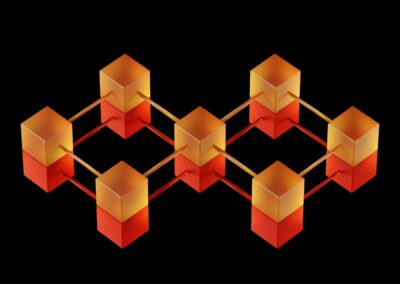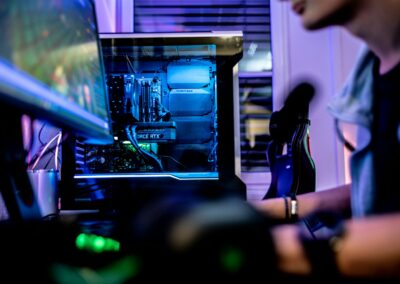Transforming Education with AI-Enhanced Gamified Learning
Integrating AI to Personalize Learning
The integration of artificial intelligence in gamified learning environments represents a significant advancement in modern education. By offering dynamic and personalized interactions, AI has the potential to transform how students engage with educational content. This transformation is particularly evident in the educational initiatives in Saudi Arabia and the UAE, where leveraging advanced technologies to improve learning outcomes is a strategic priority.
AI enhances gamified learning by analyzing student data to customize educational experiences. This means that AI can identify each student’s strengths and weaknesses, tailoring the learning material to suit their individual needs. For instance, in a gamified math learning platform, AI can adjust the difficulty level of problems based on a student’s performance, ensuring that they remain challenged yet not overwhelmed. This personalized approach helps maintain student engagement and promotes a deeper understanding of complex subjects.
Moreover, AI-driven gamified learning environments can provide real-time feedback, allowing students to learn from their mistakes and improve continuously. This immediate feedback loop is crucial for subjects like mathematics and science, where understanding concepts and correcting errors promptly can significantly enhance learning outcomes. As educational institutions in Riyadh and Dubai embrace AI technology, they are setting a new standard for personalized education in the region.
Enhancing Student Engagement Through AI
Student engagement is a critical factor in the success of any educational program, and AI plays a pivotal role in enhancing this engagement in gamified learning environments. By making learning interactive and enjoyable, AI-driven gamification captures students’ interest and motivates them to participate actively in their education. This engagement is especially important in complex subjects, where traditional teaching methods may fail to maintain student interest.
Incorporating elements such as points, badges, and leaderboards, AI can create a competitive yet collaborative learning environment. For example, in a science gamification platform, AI can track students’ progress and reward them for completing experiments accurately and efficiently. This competitive element encourages students to strive for excellence while fostering a sense of accomplishment.
Furthermore, AI can adapt the learning environment to match the evolving interests and preferences of students. By analyzing data on student interactions, AI can suggest new challenges, topics, or activities that align with their interests. This adaptability ensures that the learning experience remains relevant and engaging, making students more likely to stay motivated and committed to their studies.
Creating Immersive Learning Experiences
The combination of AI and gamified learning also paves the way for creating immersive educational experiences. Through the use of virtual reality (VR) and augmented reality (AR), AI can transform traditional learning environments into interactive, three-dimensional spaces where students can explore and experiment safely and effectively. This immersive approach is particularly beneficial for subjects that require hands-on learning, such as science and engineering.
In a VR-based gamified learning environment, AI can guide students through virtual experiments, allowing them to visualize complex scientific concepts and interact with virtual models. For instance, students can explore the human anatomy in a virtual biology lab, conducting dissections and observing physiological processes without the limitations and risks associated with physical labs. This hands-on experience deepens their understanding and retention of the material.
Similarly, AR can enhance classroom learning by overlaying digital information onto the physical world. For example, in a math class, AI-powered AR applications can project geometric shapes and equations onto students’ desks, allowing them to manipulate and solve problems interactively. This blend of physical and digital learning environments makes abstract concepts more tangible and accessible, fostering a deeper comprehension of the subject matter.
Implementing AI-Driven Gamified Learning in Educational Institutions
Case Studies from Saudi Arabia and UAE
Several educational institutions in Saudi Arabia and the UAE have successfully implemented AI-driven gamified learning, leading to remarkable improvements in student engagement and academic performance. For instance, a leading university in Riyadh integrated AI-powered gamified learning platforms into its science curriculum. The results showed increased student participation and higher test scores, demonstrating the effectiveness of this innovative approach.
In Dubai, a prestigious international school introduced AI-driven gamified learning in its mathematics program. The students showed significant improvement in their problem-solving skills and overall understanding of mathematical concepts. The school reported that the personalized feedback provided by AI helped students identify and address their weaknesses, resulting in better learning outcomes.
These case studies highlight the potential of AI to revolutionize education by making learning more engaging, personalized, and effective. As more institutions in the region adopt these technologies, they are likely to see similar positive results, further establishing Saudi Arabia and the UAE as leaders in educational innovation.
Challenges and Solutions in Implementing AI in Education
Despite the numerous benefits, implementing AI-driven gamified learning in educational institutions comes with its own set of challenges. One of the primary concerns is the initial cost of technology adoption and integration. However, many institutions are finding ways to overcome this hurdle through partnerships with technology providers and government initiatives aimed at promoting digital education.
Another challenge is ensuring data privacy and security. With AI collecting and analyzing large amounts of student data, institutions must implement robust security measures to protect this sensitive information. Clear data governance policies and advanced encryption technologies are essential to maintaining student trust and complying with regulatory requirements.
Teacher training and acceptance is also a critical factor in the successful implementation of AI-driven gamified learning. Educators need to be trained not only in using these technologies but also in integrating them effectively into their teaching strategies. Continuous professional development and support can help teachers adapt to these new tools and maximize their potential in the classroom.
The Future of AI-Enhanced Gamified Learning
The future of AI-enhanced gamified learning looks promising, with continuous advancements in technology paving the way for more sophisticated and effective educational tools. As AI becomes more integrated into learning environments, we can expect even greater levels of personalization, engagement, and interactivity. This will not only improve student outcomes but also prepare them for the challenges of a rapidly evolving technological landscape.
Moreover, the expansion of AI-driven gamified learning into new subject areas and educational levels will further enhance its impact. From K-12 education to higher education and professional training, AI has the potential to transform learning experiences at all stages of education. This holistic approach ensures that students are equipped with the skills and knowledge they need to succeed in their academic and professional endeavors.
In conclusion, the integration of artificial intelligence in gamified learning environments offers numerous benefits, from personalized learning experiences to enhanced student engagement and immersive educational environments. As educational institutions in Saudi Arabia, the UAE, Riyadh, and Dubai continue to adopt these innovative technologies, they are setting a new standard for education in the 21st century. By embracing AI, these institutions are not only improving learning outcomes but also preparing students for success in a dynamic and competitive global landscape.
—
#ArtificialIntelligence #GamifiedLearning #PersonalizedLearning #StudentEngagement #SaudiArabia #UAE #Riyadh #Dubai #ExecutiveCoaching #GenerativeAI #ModernTechnology #BusinessSuccess #LeadershipSkills #ManagementSkills #ProjectManagement























